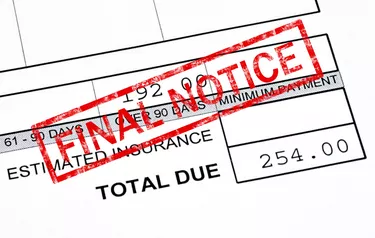
A judgment is a court-ordered award for money damages in favor of a lender or other creditor -- and against you -- in a debt collection lawsuit. Once it's filed with the court administrator's office, a judgment gives a creditor additional collection rights unless you pay the debt in full or make payment arrangements within 30 days. The longer it takes to pay an outstanding judgment, the more significant and long-lasting its financial consequences often become.
Fees and Accruing Interest
Video of the Day
In most cases, the amount you owe a judgment creditor increases to include court costs, and also may include the creditor's legal fees. The amount also includes interest that accrues on the outstanding balance from the filing date until the debt is paid in full. State laws regulate the interest rate a creditor can charge. For example, a Wisconsin judgment creditor can charge 12 percent interest on judgments entered before Dec. 2, 2012, and 1 percent plus the Federal Reserve prime rate for judgments entered on or after Dec. 2, 2012.
Video of the Day
Statute of Limitations
Although the statute of limitations on collecting an outstanding judgment generally runs for 5 to 10 years, most states allow a creditor to renew the order one or more times. According to Nolo, some states even will let a creditor renew an expired judgment. For example, a judgment entered in Minnesota runs for 10 years and can be renewed for an additional 10 years. This can potentially result in a long-term or permanent legal obligation.
Under the Fair Credit Reporting Act, a paid judgment is public record and will remain on your credit report for at least seven years. However, an outstanding judgment will remain on your credit report even longer. For example, a judgment entered in Minnesota has the potential to remain on your credit report for 20 years. Although filing for bankruptcy protection may eliminate the debt obligation, the entry will remain.
Potential Collection Consequences
An outstanding judgment gives a creditor a number of legal collection rights. These include the right to file a motion to
- conduct a debtor's examination to get information about your assets and expenses
- garnish your wages
- attach your bank account
- seize your property
To avoid these, pay the debt as quickly as you can. This may involve paying the debt through the court or to the creditor directly, depending on the rules in your state.